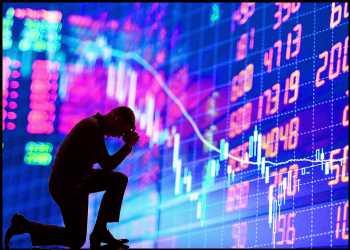Asian Shares Follow Wall Street Lower On Rate Worries

Asian stocks followed their U.S. peers lower on Friday amid concerns about slowing global growth and rising interest rates. Mass testing announcements in Shanghai also sparked fears of a return to stringent, prolonged lockdowns.
The dollar edged lower and yields struggled as traders braced for key U.S. consumer inflation data due out later in the day that will guide the Federal Reserve’s policy tightening path. Economists see an annual inflation rate for May of 8.3 percent, unchanged from April.
Chinese shares rose sharply as hopes of regulatory easing on tech firms and signs of moderating inflation offset news that China will reimpose Covid-19 lockdowns in eight out of 16 of Shanghai’s districts. Parts of Beijing have also reimposed some restrictions.
The benchmark Shanghai Composite Index jumped 1.4 percent to 3,284.83 after data showed inflation moderated in May, leaving room for authorities to ease monetary policy and release more stimulus to boost growth.
China’s factory-gate inflation rose an annual 6.4 percent last month, marking the weakest pace since March 2021, National Bureau of Statistics data showed. Consumer inflation added 2.1 percent, unchanged from April.
Hong Kong’s Hang Seng Index slipped 0.3 percent to 21,806.18 after an extremely choppy session.
Japanese shares tumbled after a hawkish ECB pushed global bond yields higher. The ECB said it would end its massive bond-buying stimulus by the end of June and begin hiking interest rates on July 21 for the first time in 11 years, followed by another hike in September.
The central bank also downgraded its growth forecasts and revised up its inflation projections.
The Nikkei 225 Index slumped 1.5 percent to 27,824.29, snapping a five-day winning streak. The broader Topix closed 1.3 percent lower at 1,943.09. Tech stocks such as SoftBank Group, Tokyo Electron and Advantest lost 2-4 percent.
Producer prices in Japan were up 9.1 percent year-on-year year in May, the Bank of Japan said earlier today. That was shy of expectations for an increase of 9.8 percent.
Seoul stocks fell, with the Kospi average closing 1.1 percent lower at 2,595.87.
Australian markets ended lower as renewed COVID-19 measures in Beijing added to worries surrounding slowing global growth.
The benchmark S&P/ASX 200 Index dropped 1.3 percent to 6,932 and closed the week down 4.2 percent, marking its biggest weekly decrease in 2 years. The broader All Ordinaries Index closed 1.3 percent lower at 7,145.20.
Weak bullion prices pulled down gold miners, with Newcrest and Northern Star Resources losing 1-2 percent. Regis Resources tumbled 3.7 percent.
In New Zealand, the benchmark S&P/NZX 50 Index declined 0.7 percent to close at 11,136.28, seeing its worst weekly loss since May 13.
U.S. stocks fell sharply overnight on inflation and interest rate worries. The Dow tumbled 1.9 percent, the tech-heavy Nasdaq Composite lost 2.8 percent and the S&P 500 slumped 2.4 percent.
Source: Read Full Article
